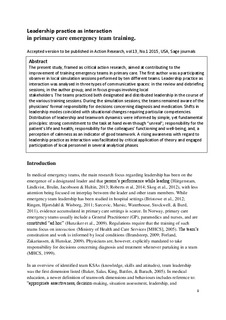| dc.contributor.author | Brandstorp, Helen | |
| dc.contributor.author | Kirkengen, Anna Luise | |
| dc.contributor.author | Sterud, Birgitte | |
| dc.contributor.author | Haugland, Bjørgun | |
| dc.contributor.author | Halvorsen, Peder Andreas | |
| dc.date.accessioned | 2016-02-17T16:45:14Z | |
| dc.date.accessioned | 2016-04-12T12:46:37Z | |
| dc.date.available | 2016-02-17T16:45:14Z | |
| dc.date.available | 2016-04-12T12:46:37Z | |
| dc.date.issued | 2015 | |
| dc.identifier.citation | Action Research 2015, 13(1):84-101 | nb_NO |
| dc.identifier.issn | 1476-7503 | |
| dc.identifier.uri | http://hdl.handle.net/11250/2385299 | |
| dc.description.abstract | The present study, framed as critical action research, aimed at contributing to the improvement of training emergency teams in primary care. The first author was a participating observer in local simulation sessions performed by 10 different teams. Leadership practice as interaction was analysed in three types of communicative spaces: in the review and debriefing sessions; in the author group; and in focus groups involving local stakeholders. The teams practiced both designated and distributed leadership in the course of the various training sessions. During the simulation sessions, the teams remained aware of the physicians’ formal responsibility for decisions concerning diagnosis and medication. Shifts in leadership modes coincided with situational changes requiring particular competencies. Distribution of leadership and teamwork dynamics were informed by simple, yet fundamental principles: strong commitment to the task at hand even though ‘unreal’; responsibility for the patient’s life and health; responsibility for the colleagues’ functioning and well-being; and a perception of calmness as an indicator of good teamwork. A rising awareness with regard to leadership practice as interaction was facilitated by critical application of theory and engaged participation of local personnel in several analytical phases. | nb_NO |
| dc.language.iso | eng | nb_NO |
| dc.publisher | SAGE Publications | nb_NO |
| dc.relation.uri | http://onlinelibrary.wiley.com/doi/10.1111/aogs.12593/epdf | |
| dc.title | Leadership practice as interaction in primary care emergency team training | nb_NO |
| dc.type | Journal article | nb_NO |
| dc.type | Peer reviewed | en_GB |
| dc.date.updated | 2016-02-17T16:45:14Z | |
| dc.source.pagenumber | 84-101 | nb_NO |
| dc.source.volume | 13 | nb_NO |
| dc.source.journal | Action Research | nb_NO |
| dc.source.issue | 1 | nb_NO |
| dc.identifier.doi | 10.1177/1476750314566660 | |
| dc.identifier.cristin | 1230710 | |
| dc.description.localcode | Author preprint | nb_NO |
